zur Diaschau
vom Mai 2002...
zur Diaschau vom Juni 2007...
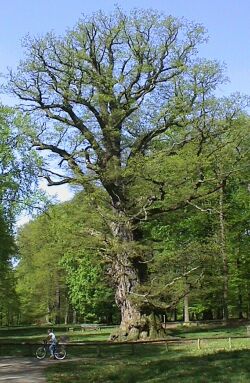
die
Königin der deutschen Eichen
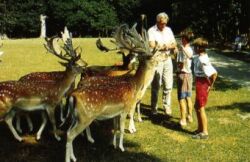
Damwild
am Futterplatz
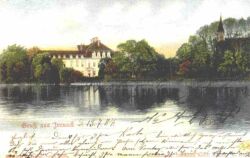
Schloßansicht
über den See im
Jahre 1904
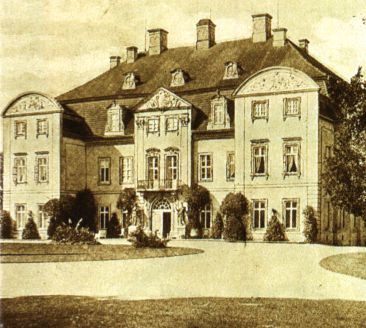
Schloßansicht von 1910

Das Schloßcafe
bietet neben
Erfrischendem auch eine kleine
Broschüre mit Wanderkarte
sowie Ansichtskarten an.
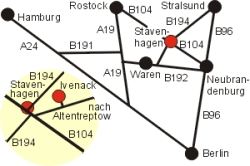
Anfahrt: zwei bis drei
Autostunden
vom Berliner Zentrum, oder per
Bahn über Neubrandenburg nach
Stavenhagen, dann eine kleine
Wanderung...
|
"So
alt wie dieser Baum möchte ich werden", dachte ich,
als ich diese Eiche zum ersten Mal sah. Aber das wird
wohl nichts werden, denn sie ist ungefähr 1200 Jahre alt... Damit ist sie die älteste Eiche in
Deutschland!! Gemeinsam mit anderen alten Eichen (ab 800
Jahre) steht der Baum bei Ivenack, einem kleinen Dorf bei
Stavenhagen in Mecklenburg. "Stavenhagen" -
dieser Ort ist jedem alten Norddeutschen ein Begriff,
denn hier wurde der große Heimatdichter Fritz Reuter
geboren. Er kannte die alten Eichen und verewigte seine
Eindrücke in platt:
"Ick weit einen
Eikbom, de steiht an de See,
De Nurdstorm, de brus't
in sin Knäst,
Stolz reckt hei de
mächtige Kron in de Höh;
So is dat all dusend Johr
west."
Doch nicht nur diese
Rieseneiche mit ihren 11 Metern Stammumfang, 35.5 Metern
Höhe und 180 Festmetern Holz ist einen Besuch wert. Die
"Eichenallee" der besonderen Art ist umgeben
von einem großen Damwildgehege und ist damit ein
weltweit einmaliger Naturpark.
Die Haltung von Wild unter den Bäumen spiegelt die
Bedingungen wider, unter denen die Eichen zur heutigen
Größe heranwachsen konnten. Der Wald wurde von den
ehemals slawischen Dorfwohnern als "Hudewald"
genutzt; die Eicheln waren ein gutes Schweinefutter. Der
Ortsnamen belegt diese slawische Nutzung:
"Iva" bedeutet "Weide".
Wenn der Leser dieser
Zeilen sich nun entschließt, nach Ivenack zu fahren,
oder einen kleinen Abstecher auf der Fahrt zum/vom Urlaub
an der Ostseeküste macht, dann möchte ich ihm noch
einige Tips mit auf den Weg geben. Gleich am Ortseingang
sollte er das Auto abstellen. Denn auf einem Spaziergang
durch das Dorf entdeckt man die schönen Fachwerkhäuser,
die Orangerie, die Kirche und das Schloß - erbaut auf
den Grundmauern des im Jahre 1252 an diesem Ort
gestifteten Zisterziensernonnen-Klosters.
Der Weg zum Gehege führt
vorbei am imposanten Marstall des ca. 1760 gegründeten
Gestüts. Hier lebte der berühmte Schimmelhengst
Herodot, der von den Franzosen nach der Besetzung
Mecklenburgs im Jahre 1806 entführt und nach dem Pariser
Frieden 1814 durch Generalfeldmarschall Blücher nach
Ivenack zurückgebracht wurde. Ein alter Chronist will
wissen, daß Napoleon den Hengst bei allen Siegeszügen
geritten habe. Der damalige Graf, Albrecht Joachim von
Plessen und seine Söhne waren maßgeblich an der
Gründung der ersten deutschen Pferderennbahn in (Bad)
Doberan beteiligt. Kurz nach dem Tod des Grafen besuchte
ein weltbekannter englischer Reiter auf seiner
Deutschlandreise das Gestüt. Er berichtete im Jahre 1829
im "Sporting Magazine" unter anderem:
"
Friday,
[August] 22d. [1828] We all mounted our horses as
soon as breakfast was over, and proceeded to Avenack,
the magnificent seat of count Plessen, distant from
Basedow about eighteen English miles. Of this family I
have already spoken, the late Count having died
about six weeks previous to my arrival in Germany,
and which circumstance was a great drawback from the
sport at Dobberan, his sons having eight horses in
training, which of course did not start. The third and
youngest son also is one of the best gentleman jockeys in
Germany; and, by all that I could learn, I should have
found him a formidable opponent in the race for the
Silver Cup.
Of the late Count I must say a word, although I had not
the pleasure to of seeing him previously to his
beeing called to his last home. From all I heard from
him, he was one of the liberal, open-hearted,
old-fashioned sort of country gentlemen, of which all
Europe was once proud, but whom the over-refinement and
hypocritical canting of the present day have endeavored
to supplant by a cantious, stiff-necked, cold-blooded,
game-preserving exquisite, whose appearance is all
but suspicious, and who thinks of little else but
himself. This much respected Nobleman lived on an
advanced age, having kept a pack of fox-hounds for
upwards of fifty years, and - as I shall shew - was one
of the most extensive breeders of horses in Germany.
The name of this Noble family is Maltzahn of whom there
are;three brothers. The elder, the present Count, was not
at home; but the two Barons Maltzahn received us with the
greatest kindness, and evinced much pleasure in shewing
us all the stud. The youngest of the brothers was for
some years the Minister of the Court of Prussia in
England, which situation he relinquished only a few years
since. It is unnecessary then to add that he was able to
converse to us in English.
We where much pleased with the approach to this grand
seat, which was through a noble avenue of oaks; and - the
first I had seen in Germany - a deer park adorned the
domain. Whether it be that we are accustomed to it in
England, but the seat of a Nobleman appears to want this
noble appendage; and when we reflect on the name
bestowed upon it by antiquity, it can scarcely be
purchased at too high a price. The timber in this park is
particularly fine; there is a piece of water, four
miles round; and - as far I could judge by merely
driving though it - a good herd of party-coloured fallow
deer.
To us the grand sight was now to come - of course I mean
the stud. Reader, do not stare; neither imagine I am
writing with a travellers licence, when I state, that in
the two first stables we entered we saw one hundred
horses in condition -;that is to say, with sleek coats
and in body clothes! These were exclusive of race-horses,
hacks, &c. which was dispersed in other stables.
The breeding stud, at the Counts death, consisted of
about ;twenty stallions and one hundred and thirty brood
mares, which, with colts of various ages and foals, made
the sum total rather more than five hundred. The present
Count has selected for himself seven stallions,
fifty-four brood mares with some colts, and all the foals
of this year, making a total of two hundred and fifty;
and the two younger brothers, the Barons Maltzahn possess
the rest.
I think I have stated before, that, in a oration spoken
in a Court of Justice by the renowned Isocrates, he
contented himself with the proof of the nobility of his
client, by tracing his pedigree to the first of his
countrymen who had won a prize in the chariot-race at the
Olympic Games. Horses then were the possessions only of
the rich and great, as indeed they in a great measure are
at present. The wealth of the principle characters in the
Bible also is generally estimated by the amount of their
cattle, and some of them were truly rich in this
description of property.
If Tacitus is to be credited, the Germans have ever been
famous for immense herds of cattle; but I little imagined
that in any one mans possession I should find the stock
as is kept at Avenack. I have already enumerated the stud
of horses, therefore I need not recur to that; but
curiosity led me to ascertain the number of sheep on the
farms occupied by the Count, when I found it amounted to
fifteen thousand! And pray, said I, to Baron Maltzahn,
how many cows do you keep here? Why, replied he, in
consequence of the great number of horses and our large
flock of sheep, we only have thirteen hundred cows!!
"
von Charles James
Apperley, bekannter unter seinem Pseudonym
"Nimrod".
|




